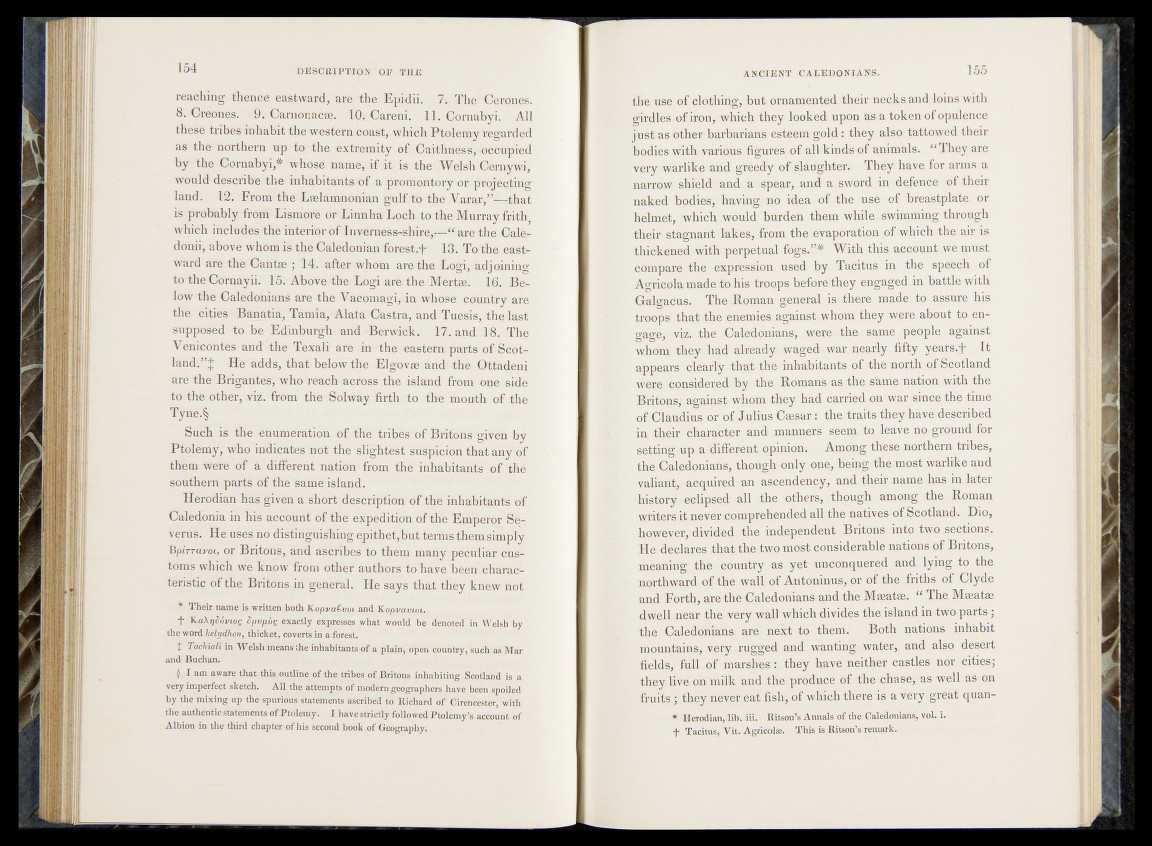
reaching thence eastward, are the Epidii. 7.. The Cerones.
8. Creones. 9. Carnonacse.. 10,. Carenï. 11. Oornabyi. All
these tribë§ inhabit the western ©oast, which Ptolemy regarded
as the northern u p fcy the extremity of Caithness, occupied
by the Cornabyi,* whose name, if it* is -the Welsh Cernywi,
would describe the inhabitants of a promontory or?projec-ting
land. 12. From the Lselamnonian gulf to the Varar,”-™that
is probably from Lismore or Linnha Loch to the Murray frith,
|i which includes the interior of -InyerimssHBhire,^' are the Cale-
donii, above whom is the Caledonian forest^* 13. To the east?
ward are the Gantae ; 14. after whom are the^Lo^^tadjoinimg
to the Comayii. 15. Above the; Logi are the M e rte ,v!6. Below
the Caledonians arc the Vaeomagi^in whose country are
the cities Banatia, Tamia, Alata Castra, and Tuesis, the last
supposed to be Edinburgh and Berwick. 17. and 18. The
Veniedntes and the Texali are in the, eastern parts of Sect-
land.”+ He adds, that below the Elgovm'dnd'the Ottadeni
are the Brigantes, Who reach across the island from one.side
to the other, viz. from the Solway firth to the mouth of tlfe
Tyne.§
Such is the enumeration of the tribesvof Briton's given by
Ptolemy, who indicates not the slightest suspicion that any of
them were of a different nation from the inhabitants of the
southern parts of the same island.
Ilerodian has given a short description of the inhabitants of
Caledonia in his account of the expedition of the Emperor S |-/
verus. He uses no distinguishing epithet,but terms them simply
BpiTTavoi, or Britons, and ascribes to them many peculiar customs
which we know from other authors to have been characteristic
of the; Britons in general. He says that they knew hot
* Their name is written .both K o p y a S v o i and K o p v a v tm .
t KaX riS o v ip g S p vp .b e exactly expresses what would be denoted in Welsh by
the word k e lyd h o n , thicket, coverts in a forest.
X T a c h ia li in Welsh means the inhabitants of a plain, open country, such as Mar
and-Buchan.
§ .1 am aware that this outline pf the tribes of Britons inhabiting.Scotland i$ a
very imperfect sketch. All the attempts’ of modern geographers have been spoiled
by the mixing up the spurious statements ascribed to Richard of Cirencester, with
the authentic statements of Ptolemy. I have strictly followed Ptolemy’s account of
Albion in the third chapter of his second hook of Geography.
the usd ©f’ @l(î>thing, but> ornamented their necks and loins with
gh?dles>tof iron, which they looked upon as a token of opulence
just-as other.hafbaria^d^eirifggi^ : they afep^attowed their
bodieswith various,-figures?» of all fcinds of animals. “ They are
'very1 warlike and greedy*of slaughter. They-haye.for arms a
narrow »shield andya> spear,, and a -®Acrid dniAgfippcp ° t their
naked boddeS, Eavingrino idea o$ri$h&s jusds* of -brbastplate^pr
helmet, which would burden them while swimming through
their stagnant l^besj^fe^U; fb e'iéYapor^tjph o f which tbe air-, is
fhiekened with.» • iWith thisvâ^puntiweipust
' Compare. tlm e'xgpbbrilih, used by, Tacitus in,Abe speech}»,.of
Aj^iç||ja madpAp his^t|^|)& befpreAWyn^’g^g6^!© battjf -with
Galgacus.s. The Roman^gpnejltl: is therd^in^p^tp^a^iaip f
troopsijthafÿthe enem%^against'jwhom th e yH ^ ^ a b o u f to^en-
,gage,^ti|d the1 Caledonians, were against
whom t]bey liad'aheady. w5age.dvwar-nearly fi|ty yearSijr,-. It
appears clearly f â a il|t^ ^ h a b ita n i^ :§ |,||h î.n p rth og^potland
Were-v t^nsiderddflby " the Romans as t-hg^same, nalippiiwÿth the
Britpos^rilglpn-st whom they had Carried, j ^l| tthe time
ofïQlaudius or of Julius Cæsari the traits f h e y ^ | d ^ | i b e 4
in their character - a^^mapnerSj, leave , n ^ ^ p n d fpr
H H | B aAi^erpnt. opinion. Ampngth^sn^ri'hern tr ib ^ ,
the Caledonians, thppgh only one,, being fhe n ^ t warlike,apd
valiant, acquired an ^spendency, and their n am e d ^ jin later1
history eclipsed all the,.others, thppgh^ainopg^the. Roman
writes it never comprehended all jfche natives|pf ^eotland. Dip*
however,.divided the.independent Britons into twp^dcrio^^
He declares that,the.two most considerable natiops^pf Britons,
meaning the .country as yet|||uconquered and flying td the
northward of the wallof Antoninus, opef.thefriths of Clyde
and Forth, are the Caledonians and the Mæatæ.iJf The Mæatæ
dwell near the yery wall which diridds the island in two parts'*
the Caledonians are next td them. Both nations inhabit
mountains, very rugged and wanting water,, and also desert
fields, full of marshes : they have neither castles nor cities;
they live oh milk and the produce of thd?dhhse, as well as on
fruits ; they never èat fish, pf w.hi&h there »is a very’great quan-
* Herodian, lib. iii. Ritson’s A nnàls of tbe- Cale^.oniaiis^ vol. i.
f Tacitus, Vit. Agricolæ. This is Ritson’s remark.